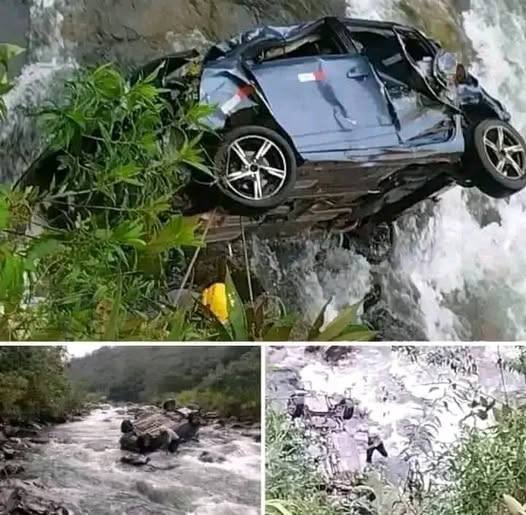An early Sunday morning in Santiago, Chile, turned into a scene of chaos and disbelief when a serious accident ended with a car plunging into the Mapocho River, exposing once again the devastating consequences of reckless and intoxicated driving. At around 2:30 a.m., a private vehicle traveling at high speed along Avenida Costanera Norte lost control near the Puente Purísima intersection.

Witnesses described the car zigzagging violently before breaking through a safety barrier and plummeting nearly six meters into the riverbed below. The accident immediately caught the attention of onlookers, who quickly alerted emergency services, fearing that no one inside the vehicle could have survived such an impact. “It was like watching a movie crash scene,” recalled a night worker who saw the accident unfold. “The speed, the sudden loss of control, and then the car just disappeared into the river. We thought it was certain death.” Yet against all odds, the driver, later identified as 28-year-old Matías C., managed to free himself from the wreckage and crawl to the riverbank. Though shaken and bruised, he was conscious when rescue teams arrived and was quickly transported to the University of Chile Clinical Hospital for treatment. Doctors confirmed he had sustained multiple minor injuries but was in stable condition.
However, the sense of relief over his survival was quickly overshadowed by outrage when the results of a breathalyzer test were released: the driver had 1.3 grams of alcohol per liter of blood, well over the legal limit in Chile, confirming that he had been driving while intoxicated. The revelation ignited a storm of reactions across social media, where users voiced anger and condemnation. “This wasn’t an accident, it was negligence,” wrote one commenter. Others emphasized the danger he had posed not only to himself but to countless others had the crash occurred at a busier hour.
“He’s lucky no one else was killed,” another user pointed out. Fortunately, no pedestrians or other vehicles were involved in the accident due to the late hour, a small consolation that authorities underscored in their official statements. Carabineros Commander Pablo Álvarez stressed that the area where the accident occurred is notorious for reckless driving, with many drivers using the Costanera stretch as a high-speed corridor. “We have repeatedly urged responsibility on the road,” Álvarez said, “but cases like this make clear that there are still individuals who underestimate the dangers of drunk driving, putting not only themselves but also others at risk.”
The vehicle, completely wrecked from the impact, required a complex recovery operation that lasted several hours. Specialized machinery was deployed to extract the car from the river, while municipal crews evaluated damage to the bridge’s protective railings, which had been torn apart during the crash. Immediate repairs were scheduled to ensure the safety of drivers using the road in the coming days. As for legal consequences, prosecutors wasted no time in pressing charges.
On Monday, Matías C. was formally accused of drunk driving and causing damage to public property. The court ordered overnight house arrest, the suspension of his driver’s license, and required him to report monthly while the investigation continues. Authorities also indicated that charges could be escalated if it is found that the driver has a prior history of similar reckless behavior. The case has reignited public debate in Chile over the dangers of drunk driving, a persistent issue that remains one of the country’s leading causes of road fatalities. Campaigns against alcohol-impaired driving have long warned of its deadly risks, but incidents like this continue to demonstrate how some drivers still gamble with their lives and the lives of others.
Officials once again issued strong reminders to the public. “There are absolutely no excuses,” emphasized one traffic authority. “If you’re going to drink, don’t drive. It’s that simple. Incidents like this should serve as a warning: you may survive, but next time, you might take someone else’s life or not live to tell the tale.” This accident, while not resulting in fatalities, stands as a chilling reminder of what could have happened. The combination of alcohol, speed, and irresponsibility nearly turned into a tragedy that might have claimed multiple lives. For many Chileans, the shocking images of a car submerged in the Mapocho River will remain a stark example of the urgent need for accountability, stricter enforcement, and above all, a cultural shift toward safer, more responsible driving habits.





